Crime and punishment in the wildlife trade - WWF UK
Crime and punishment in the wildlife trade - WWF UK
Crime and punishment in the wildlife trade - WWF UK
Create successful ePaper yourself
Turn your PDF publications into a flip-book with our unique Google optimized e-Paper software.
7 Conclusions<br />
Several <strong>the</strong>mes have emerged from this report, many of which militate aga<strong>in</strong>st <strong>the</strong> effective<br />
protection of <strong>wildlife</strong> from illegal <strong>trade</strong>. International law, through <strong>the</strong> operation of CITES,<br />
provides a framework which, although not perfect, sets out clear priorities <strong>and</strong> a rationale for<br />
protect<strong>in</strong>g <strong>the</strong> world’s threatened species. But it is essential that <strong>in</strong>dividual countries reflect <strong>the</strong><br />
pr<strong>in</strong>ciples of CITES <strong>in</strong> <strong>the</strong>ir own laws <strong>and</strong> practice. Education <strong>and</strong> tra<strong>in</strong><strong>in</strong>g has a key role, so <strong>the</strong><br />
development of effective guidel<strong>in</strong>es <strong>and</strong> awareness-rais<strong>in</strong>g programmes for those charged with<br />
adm<strong>in</strong>ister<strong>in</strong>g <strong>the</strong> law should be a priority.<br />
Where <strong>the</strong> enforcement of law to combat <strong>the</strong> illegal <strong>wildlife</strong> <strong>trade</strong> is concerned, <strong>the</strong> challenges<br />
<strong>in</strong> <strong>the</strong> <strong>UK</strong> context are considerable. Effective action would <strong>in</strong>volve:<br />
• an appropriate, workable <strong>and</strong> effective legal framework;<br />
• <strong>the</strong> judicial <strong>and</strong> political will to enforce <strong>the</strong> laws with<strong>in</strong> that framework;<br />
• appropriate use of all available legal sanctions;<br />
• adequate resourc<strong>in</strong>g of those agencies responsible for enforcement;<br />
• environmental vigilance, <strong>in</strong> terms of monitor<strong>in</strong>g <strong>and</strong> updat<strong>in</strong>g CITES <strong>and</strong> EU list<strong>in</strong>gs <strong>in</strong> l<strong>in</strong>e<br />
with <strong>the</strong> precautionary pr<strong>in</strong>ciple 84 ; <strong>and</strong><br />
• heightened public awareness of <strong>the</strong> consequences of <strong>the</strong> illegal <strong>wildlife</strong> <strong>trade</strong>, which would<br />
underp<strong>in</strong> <strong>in</strong>formed support for <strong>the</strong> full enforcement of <strong>the</strong> law; <strong>and</strong><br />
• environmental vigilance at all times.<br />
There are vary<strong>in</strong>g <strong>and</strong> <strong>in</strong>consistent approaches to <strong>the</strong> law <strong>and</strong> <strong>the</strong> imposition of penalties for<br />
illegal <strong>wildlife</strong> <strong>trade</strong>. This clearly raises questions concern<strong>in</strong>g any deterrent value. The fear of a<br />
severe penalty is not sufficient on its own to deter; <strong>the</strong> potential offender must realise that <strong>the</strong>re<br />
is a certa<strong>in</strong>ty of detection <strong>and</strong> arrest, <strong>and</strong> that <strong>the</strong> authorities will prosecute. At present, this is<br />
unlikely <strong>in</strong> <strong>the</strong> <strong>UK</strong>. The risk that <strong>wildlife</strong> offenders take is m<strong>in</strong>imal, <strong>and</strong> <strong>the</strong> rewards extremely<br />
high, when balanced aga<strong>in</strong>st <strong>the</strong> chance of gett<strong>in</strong>g caught <strong>and</strong> <strong>the</strong> likely penalty that would<br />
be imposed.<br />
The penalty is not just an external matter or an occupational hazard – it signifies society’s<br />
disapproval. Levels of tolerance can <strong>and</strong> do shift, as we have seen <strong>in</strong> attitudes to domestic<br />
violence <strong>and</strong> dr<strong>in</strong>k driv<strong>in</strong>g. Change may be equally possible <strong>in</strong> relation to <strong>wildlife</strong> <strong>trade</strong>.<br />
At present, many feel that <strong>the</strong> penalties imposed <strong>in</strong> most cases do not adequately signal <strong>the</strong><br />
seriousness <strong>and</strong> impact of offences that threaten <strong>the</strong> survival of species.<br />
Recognition of <strong>the</strong> scale <strong>and</strong> impact of illegal <strong>trade</strong> as far as <strong>the</strong> <strong>UK</strong> is concerned is not explicit<br />
<strong>in</strong> <strong>the</strong> courts’ treatment of <strong>the</strong> majority of offenders: with a h<strong>and</strong>ful of high profile exceptions,<br />
<strong>the</strong> higher available penalties are not utilised. But change is possible: similar criticisms when<br />
levelled at environmental prosecutions served to push forward <strong>the</strong> enforcement agenda <strong>and</strong><br />
yielded modest returns. There is now a perception that environmental crimes are more than just<br />
regulatory offences <strong>and</strong> deserve to be treated <strong>in</strong> a manner that reflects social harm <strong>in</strong><br />
environmental damage. The same th<strong>in</strong>k<strong>in</strong>g should be applied to <strong>the</strong> protection of <strong>wildlife</strong> from<br />
illegal <strong>trade</strong>, so that levels of penalty reflect its potentially irrevocable effects <strong>in</strong> terms of <strong>the</strong><br />
loss of species <strong>and</strong> threat to biodiversity.<br />
84 As attempted <strong>in</strong> relation to <strong>the</strong> bask<strong>in</strong>g shark at COP11.<br />
31


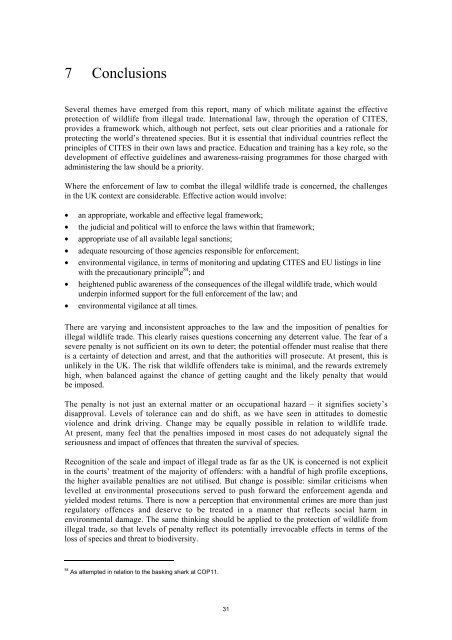
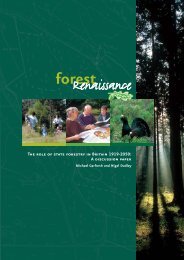
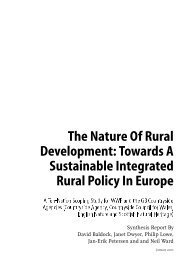
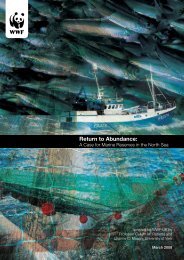
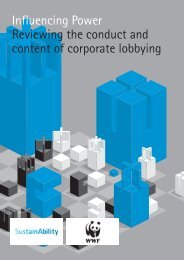
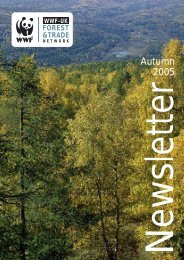
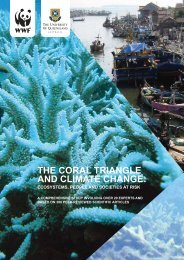

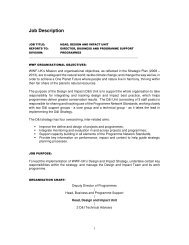
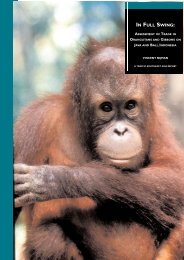
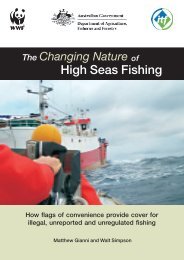

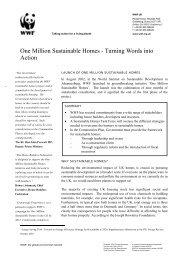
![[PDF] Causes for concern: chemicals and wildlife - WWF UK](https://img.yumpu.com/31929970/1/184x260/pdf-causes-for-concern-chemicals-and-wildlife-wwf-uk.jpg?quality=85)
